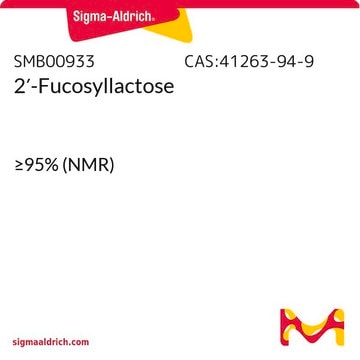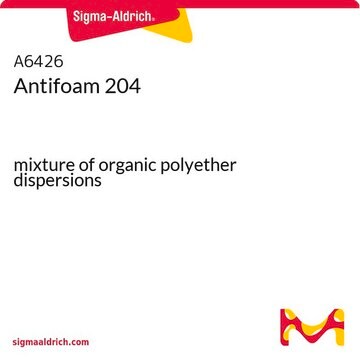B11001
EnPresso® B
Growth system for expressing protein in bacteria
Sign Into View Organizational & Contract Pricing
All Photos(3)
About This Item
UNSPSC Code:
12352200
Recommended Products
sterility
sterile; γ-irradiated
form
tablet
manufacturer/tradename
(BioSilta Oy)
pH
6.8
shipped in
ambient
storage temp.
room temp
General description
Enpresso B by BioSilta Oy
Biochem/physiol Actions
EnPresso® B is a pre-sterilized growth system designed to increase the yield of functional protein from E. coli-based expression systems.
EnPresso® growth systems provide optimal conditions for growth, metabolism and protein expression in microbial cultures. Protein yields are increased by enabling cultures to reach far higher cell densities than those achieved using conventional media. By controlling growth rate and metabolism, a greater proportion of expressed protein can be correctly folded to improve solubility, minimize the risk of inclusion body formation, and ensure functionality of the final product.
EnPresso® growth systems maintain pH, provide adequate minerals, vitamins and trace elements to support growth, and use proprietary EnBase™ technology to ensure a constant, slow release of glucose from a polysaccharide substrate.
See all available products from EnPresso B Growth Systems.
EnPresso® growth systems provide optimal conditions for growth, metabolism and protein expression in microbial cultures. Protein yields are increased by enabling cultures to reach far higher cell densities than those achieved using conventional media. By controlling growth rate and metabolism, a greater proportion of expressed protein can be correctly folded to improve solubility, minimize the risk of inclusion body formation, and ensure functionality of the final product.
EnPresso® growth systems maintain pH, provide adequate minerals, vitamins and trace elements to support growth, and use proprietary EnBase™ technology to ensure a constant, slow release of glucose from a polysaccharide substrate.
See all available products from EnPresso B Growth Systems.
Physical form
EnPresso® B is supplied in a kit providing sufficient reagents for 20 separate 50 ml cultures. Included in the kit:
40 tablets in 20 white bags
20 tablets in 20 black bags
1 bottle (5 ml) Reagent A
40 tablets in 20 white bags
20 tablets in 20 black bags
1 bottle (5 ml) Reagent A
Legal Information
EnBase is a trademark of BioSilta Oy
EnPresso is a registered trademark of BioSilta Oy
related product
Product No.
Description
Pricing
Signal Word
Danger
Hazard Statements
Precautionary Statements
Hazard Classifications
Aquatic Chronic 3 - Carc. 1B - Eye Irrit. 2 - Skin Sens. 1 - STOT RE 2
Storage Class Code
6.1C - Combustible acute toxic Cat.3 / toxic compounds or compounds which causing chronic effects
Choose from one of the most recent versions:
Certificates of Analysis (COA)
Lot/Batch Number
Sorry, we don't have COAs for this product available online at this time.
If you need assistance, please contact Customer Support.
Already Own This Product?
Find documentation for the products that you have recently purchased in the Document Library.
Customers Also Viewed
Jian Li et al.
Journal of biotechnology, 193, 16-22 (2014-12-03)
Heterologous expression of secondary metabolite biosynthesis pathways in a surrogate host, e.g. Escherichia coli, has emerged in recent years as an effective way to produce complex natural products. The nonribosomal peptide (NRP) antibiotic valinomycin has been recombinantly produced in E.
Nobalanda Mokoena et al.
Biochemical and biophysical research communications, 437(3), 342-348 (2013-07-06)
Family VIII esterases represent a poorly characterised esterase family, with high sequence identity to class C β-lactamases, peptidases and penicillin binding proteins. This study reports on the metagenomic library screening and biochemical characterisation of a novel esterase (Est22) derived from
Valeria Cafardi et al.
PloS one, 8(11), e81306-e81306 (2013-12-05)
Clostridium difficile is a major cause of infectious diarrhea worldwide. Although the cell surface proteins are recognized to be important in clostridial pathogenesis, biological functions of only a few are known. Also, apart from the toxins, proteins exported by C.
Thomas Horn et al.
Redox biology, 1, 566-577 (2013-11-28)
Mammalian lipoxygenases play a role in normal cell development and differentiation but they have also been implicated in the pathogenesis of cardiovascular, hyperproliferative and neurodegenerative diseases. As lipid peroxidizing enzymes they are involved in the regulation of cellular redox homeostasis
Marco Becherelli et al.
PloS one, 8(9), e74718-e74718 (2013-09-27)
Staphylococcus aureus is an opportunistic pathogen, commensal of the human skin and nares, but also responsible for invasive nosocomial as well as community acquired infections. Staphylococcus aureus adheres to the host tissues by means of surface adhesins, such as SdrC
Our team of scientists has experience in all areas of research including Life Science, Material Science, Chemical Synthesis, Chromatography, Analytical and many others.
Contact Technical Service











